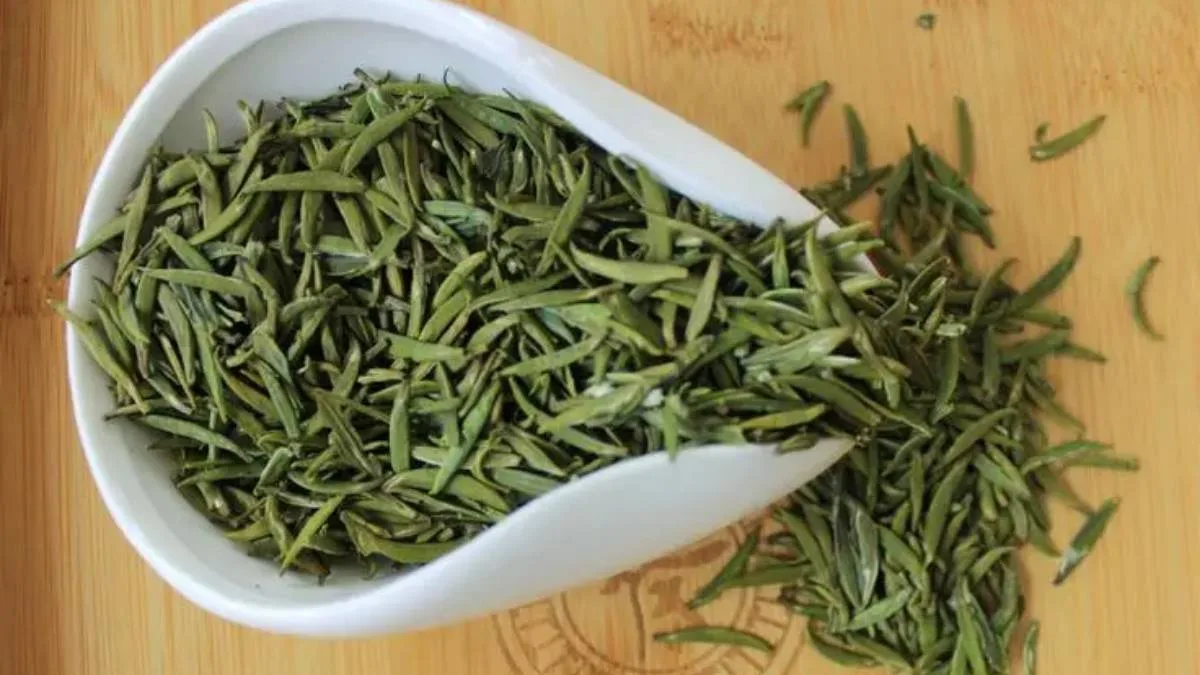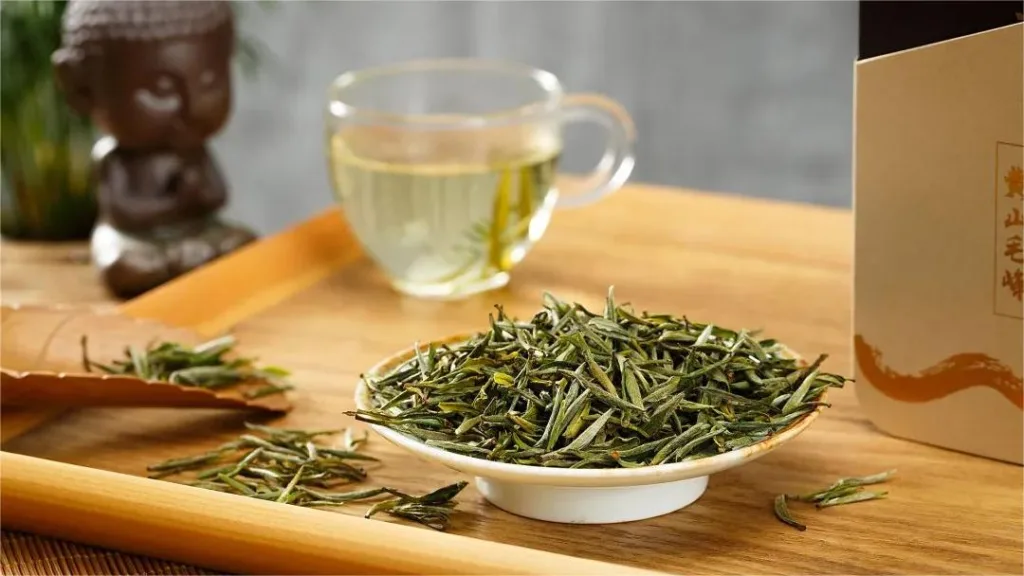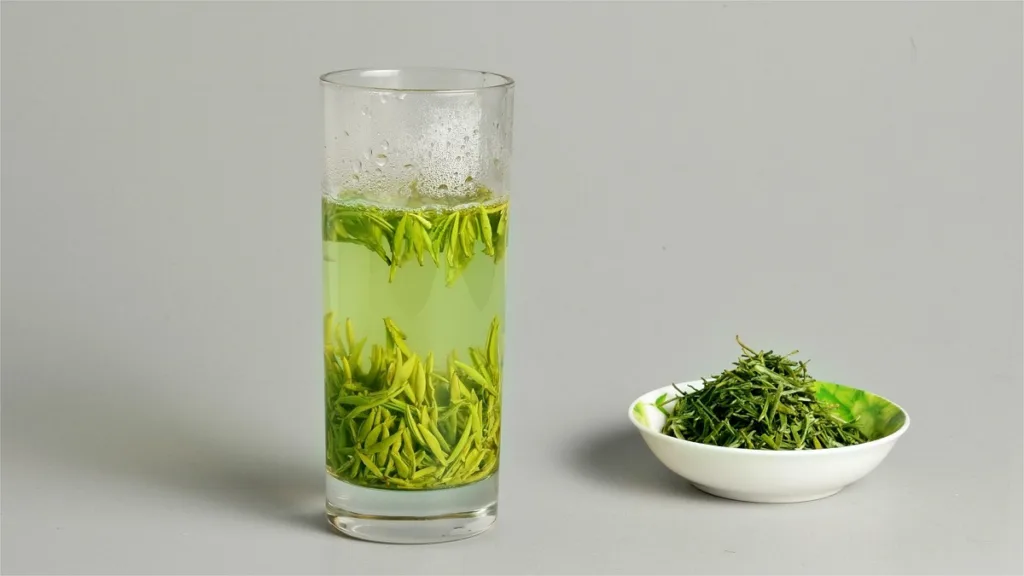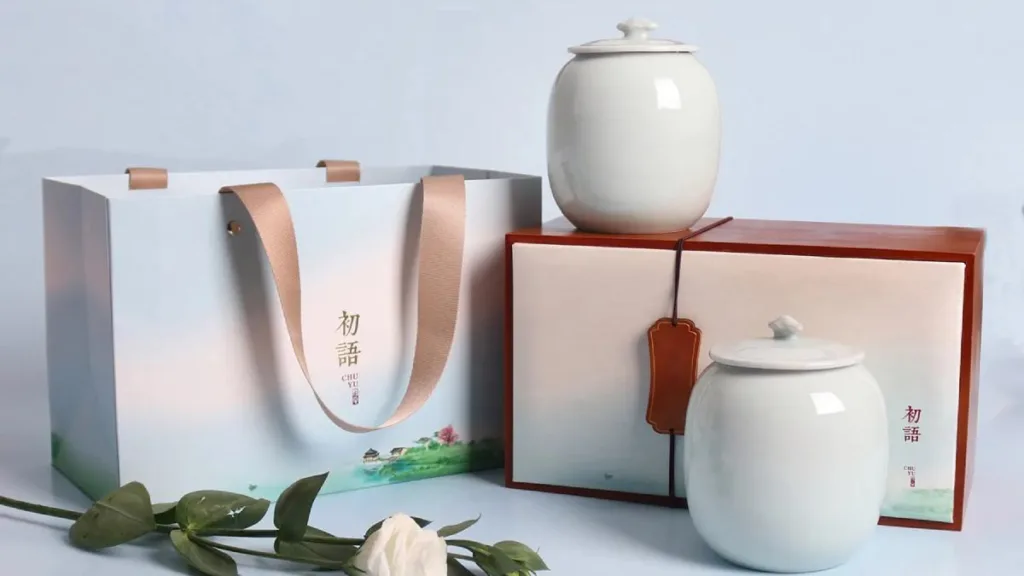Jinshan Cuiya Tea, a speciality of Zhenjiang City, Jiangsu Province, is a nationally recognized geographical indication of agricultural products.
Origin and Climate
The region where Jinshan Cuiya Tea is produced falls within the typical North Subtropical Warm Subzone. It boasts an average annual temperature of 15.2°C, characterized by a distinct four-season climate and a stable accumulated temperature of 4700-5000°C above 10°C. With approximately 2073.7 hours of sunlight per year, Zhenjiang is a cultural crossroads between North and South China, enriched with a history of tea culture. Zhenjiang is also famous for the idiom “以茶代酒” (yi cha dai jiu), which means “to replace alcohol with tea.” Jinshan Cuiya Tea is known for its flat, evenly-shaped leaves, distinct green color with abundant tips, rich and intense flavor, bright emerald green infusion, long-lasting aroma, and full and even leaf bottoms.
History
Zhenjiang, located at the crossroads of Northern and Southern Chinese cultures, has a rich heritage of tea culture, particularly in the form of poetry and anecdotes. The idiom “以茶代酒” (to replace alcohol with tea) originated from Zhenjiang, as detailed in “三国志·吴志” (Records of the Three Kingdoms). The renowned spring “天下第一泉” (the first spring under heaven) is associated with tea, first documented in the Tang Dynasty’s “煎茶水记” (Record of Brewing Tea). The text ranked “泠泉” (lingquan) in the Yangtze River as the top spring. Notable tea poems associated with Zhenjiang include:
- “蒙顶山上茶,扬子江心水” (Tea on Mengding Mountain, water from the Yangtze River).
- “山中有景无多地,天下知名第一泉” (In the mountains, there is not much scenery, but the world knows the number one spring).
- “日斜未放沧浪渡,饱酌中泠洗宿心” (The sun sets but has not crossed Canglang Ferry, drinking tea with a refreshed heart).
- “扬子江心第一泉,南金北来铸文渊。男儿斩却楼兰首,闲品茶经拜羽仙” (The first spring in the heart of the Yangtze River, crafting a cultural ocean from north to south. Men cut the head of Loulan, leisurely enjoying tea and paying respects to the feathered immortals).
- “铜瓶愁汲中泠水,不见茶山九十翁” (Copper flasks filled with water from the Ling Spring, not seeing the ninety-year-old tea farmer or his tea mountain).
- “缓酌中泠泉,曾传第一泉。如能作霖雨,沾酒遍山行” (Slowly sipping the Ling Spring, known as the number one spring. Like a gentle rain, it drenches the entire mountain when combined with wine).
These tea poems and associations with Zhenjiang have significantly contributed to the development of Zhenjiang tea culture. During the Qing Dynasty, Zhenjiang’s production of green tea accounted for one-sixth of the national total.
In 1981, Zhenjiang’s tea researchers began working on creating a named tea. In 1982, trial production of Jinshan Cuiya Tea commenced at facilities such as Zhenjiang Xiasu Tea Factory and Wuzhou Tea Factory. Starting in 1994, Zhenjiang conducted experiments in mechanized tea production to maintain the style of Jinshan Cuiya and improve its quality, achieving success. In 1995, several major tea-producing facilities in Zhenjiang, including those owned by Chen Wusheng, developed the enterprise standards for Jinshan Cuiya Tea. These standards were later released and implemented by the Zhenjiang Bureau of Standards. In 1996, Zhenjiang promoted the mechanized processing of Jinshan Cuiya Tea throughout the city.
Brewing Method
- Clean Tea Utensils and Warm the Cup: Begin by adding hot water to a glass cup, filling it about three-quarters full. Gently swirl the glass cup to ensure that the interior is thoroughly warmed. This step helps to enhance the release of the tea’s aroma and maintains the natural qualities of Jinshan Cuiya Tea.
- Adding Tea: Embed approximately 3 grams of Jinshan Cuiya Tea into the glass cup. No additional ingredients are necessary; this is known as the “clear drinking” method.
- Moisten the Tea: Use water at a temperature between 85 to 90 degrees Celsius to infuse the tea. Fill the cup with about three-quarters of water, then gently shake to ensure that the leaves are fully soaked and moistened.
- Steeping: After moistening the tea leaves thoroughly, add hot water at a temperature between 85 to 90 degrees Celsius until the cup is filled to about 7/8ths.
- Appreciation: As the tea leaves move within the cup, they will gradually unfold, at times rising like fish swimming upstream and at other times descending gently. Gaze at the tea as it settles and slowly unfurls. Afterward, deeply inhale the aroma before sipping the tea to savor its true essence. A deep breath allows the fragrant orchid scent of Jinshan Cuiya Tea to permeate your senses, leaving you feeling refreshed.
- Enjoying the Tea: Once the tea leaves have fully unfurled, you can savor it slowly. Before drinking, it is customary to first appreciate the aroma of the tea, then savor its flavor, enabling a profound understanding of the tea. Take a deep breath to allow the enchanting fragrance of Jinshan Cuiya Tea to deeply penetrate your being, leaving you feeling refreshed.
Health Benefits
- Quenching Thirst and Cooling: Jinshan Cuiya Tea contains polyphenols, sugars, amino acids, and pectin. These substances react with saliva, stimulating its secretion and providing a refreshing and moist sensation in the mouth. Regular consumption of Jinshan Cuiya Tea can relieve thirst and heat.
- Boosting Vitality: Jinshan Cuiya Tea contains various nutrients. During physical activity, the body primarily burns fat for heat, retaining the liver’s vinegar, which aids in weight loss and body shaping. Regularly consuming Jinshan Cuiya Tea can help maintain vitality.
- Weight Loss: Jinshan Cuiya Tea contains caffeine and theobromine, which can activate protein kinase and triglyceride lipase through various mechanisms, reducing the accumulation of fat cells and supporting weight loss.
- Anti-Inflammatory and Antibacterial: Rich in catechins, Jinshan Cuiya Tea can bind with bacteria in single cells within the human body, inhibiting their harm. In daily life, applying strong Jinshan Cuiya Tea soup or steeped tea leaves to wounds can effectively disinfect and kill bacteria.
- Detoxification: Tea was initially discovered as a detoxifying remedy. Regular and moderate consumption of Jinshan Cuiya Tea can help detoxify the body, removing toxins.
Legend has it that during the Ming Dynasty, Liu Ji deeply loved this tea and became an immortal at Wuyishan. To protect the descendants of Zhu Hongwu, he cut the dragon’s veins of the mountain and planted tea trees. Although this tea may not offer miraculous longevity, it does provide numerous health benefits.




